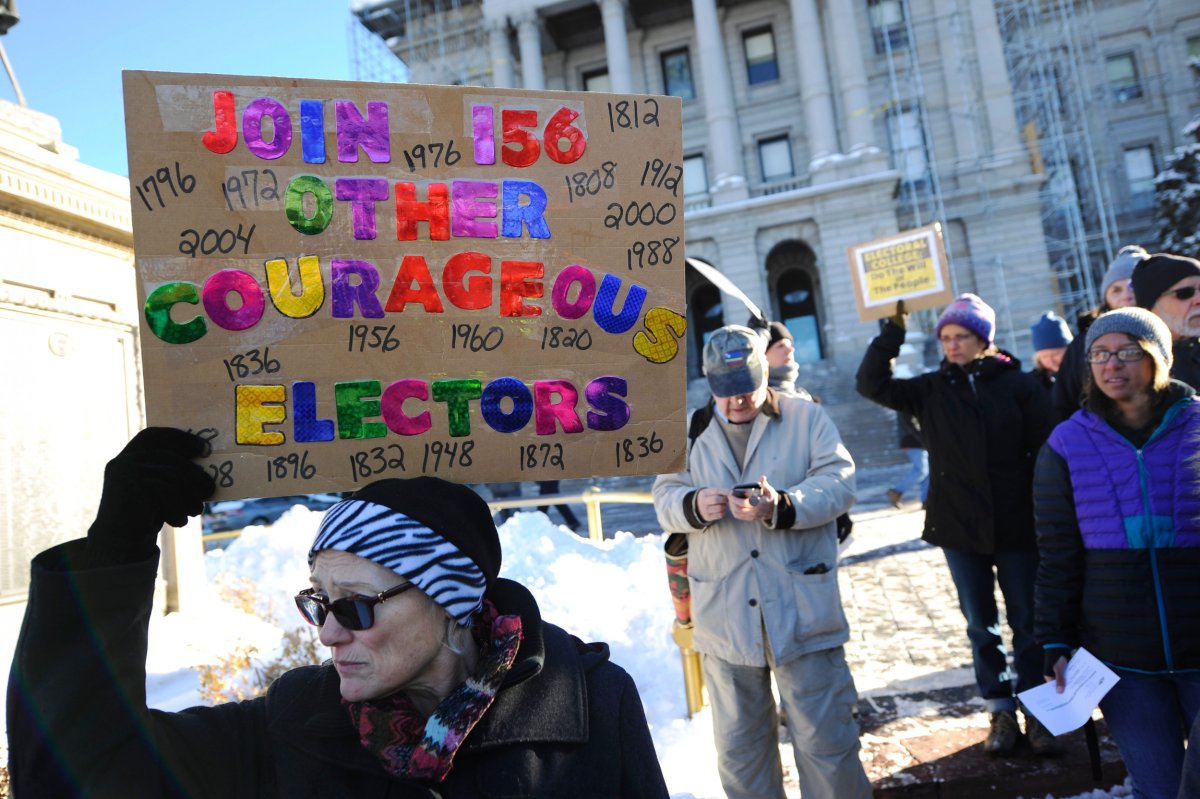The Supreme Court ruled Monday that states can remove "faithless electors," who vote contrary to the people's wishes, four years after 10 members of the Electoral College broke ranks.
The Court unanimously ruled that states can effectively prohibit Electoral College representatives from voting for someone whom they didn't pledge to support. The ruling came from a case in Washington state in which three electors challenged a law that allowed them to be fined for choosing how to cast their ballot.
In the 2016 presidential election, 10 of the 538 Electoral College representatives were deemed "faithless electors." Eight chose not to vote for Democratic candidate Hillary Clinton, and two broke from voting for Republican candidate Donald Trump.
Instead of Clinton, one representative voted for Senator Bernie Sanders, three chose former Secretary of State Colin Powell, and one voted for Faith Spotted Eagle, a woman who is a member of the Yankton Sioux Nation, according to CBS News. Trump lost a vote to Ohio Governor John Kasich and another to former Representative Ron Paul.
One representative chose to cast a ballot for Ohio Governor John Kasich instead of Clinton, but he was replaced with someone who voted for the Democratic Nominee. A Minnesota representative was also dismissed for his Sanders vote, and a Maine representative had to recast his ballot choice from Sanders to Clinton.
One of the "faithless electors" in Washington, where Clinton won by almost 16 percentage points, was Bret Chaifalo, who was fined $1,000 for his vote. He filed a lawsuit that said the state's law restricting electors' votes was unconstitutional, and the case eventually came before the Supreme Court in May.
The justices unanimously ruled in Washington state's favor on Monday. They determined that laws that fine or remove someone who fails to vote for the candidate he or she pledged to support do not violate the Constitution
"Article II and the Twelfth Amendment give states broad power over electors, and give electors themselves no rights," Justice Elena Kagan wrote in the court's opinion.

On Election Day, eligible voters cast their ballots for president in what's called the popular vote. But the person who gets the most Electoral College votes, which are intended to represent the will of the state, becomes president.
There have been four elections—1876, 1888, 2000 and 2016—where a candidate won the popular vote but lost the election because another candidate received more Electoral College votes.
Justice Samuel Alito raised the question of whether allowing Electoral College representatives to vote how they please would create an environment where people put pressure on representatives to vote a specific way. Assuming the popular vote was close and changing a few votes would change the outcome, he asked if the plaintiffs would deny that it was a "good possibility" the losing political party would launch a "massive campaign to try to influence electors," causing a "long period" of uncertainty about the next president.
Harvard Law professor Lawrence Lessig, who is representing Chaifalo, denied it was a "good possibility" but said it was possible.
"We agree that, of course, the possibility exists that you could flip electors. But look historically at the number of times that could have mattered," Lessig said. "In fact, in the history of electors, there has been one elector out of the 23,507 votes cast who have switched parties against the majority party in a way that could have mattered."
Had all the "faithless electors" cast their ballots for Clinton, Trump still would have won the election by more than 60 Electoral College votes. However, swinging 10 electors in five previous presidential races could have changed the results, Lessig said in court papers, according to CNBC. Therefore, it was imperative that the court resolve the issue before November.
In a statement to Newsweek, Lessig said that obviously his view (and that of the plaintiffs) of the Constitution differs from the Court's, but he noted he was happy that the question was answered before it created a "constitutional crisis."
"But now that the Court has essentially removed 'electors' from the Constitution, it is time we think about why the Electoral College makes any sense at all anymore," Lessig said.
Uncommon Knowledge
Newsweek is committed to challenging conventional wisdom and finding connections in the search for common ground.
Newsweek is committed to challenging conventional wisdom and finding connections in the search for common ground.
About the writer
Jenni Fink is a senior editor at Newsweek, based in New York. She leads the National News team, reporting on ... Read more
To read how Newsweek uses AI as a newsroom tool, Click here.








